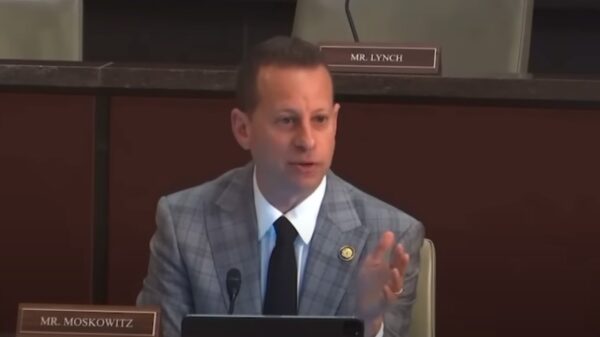Opinion Column by Ross Marchand
Ever since the United States Agency for International Development (USAID) was shuttered by the Trump administration, pundits and politicians have been digging up the wackiest-sounding grants green-lit by the agency. Few could have guessed that USAID was propping up post offices around the world. The U.S. government feels uniquely positioned to steer global postal management, even though the U.S. Postal Service’s (USPS) track record isn’t exactly a glowing endorsement.
One notable beneficiary of U.S. taxpayer money was Ukraine’s postal service — Ukrposhta — before the latest war even started. Here are the details from a 2020 announcement on the postal provider’s website:
The joint initiative of the UkrPoshta E-Export School and the USAID Competitive Economy of Ukraine Program (CEP) aims at preparing Ukrainian SME handmade manufacturers to export their products. Participating Ukrainian SMEs will receive a step-by-step guide on how to start exporting, essential legal and financial information, and tips on foreign trade expansion for those who already are exporting. … The initiative will provide SMEs with a guide on how to start selling abroad and reveal the success stories of Ukrainian entrepreneurs who already export their products internationally.
It would be one thing if the U.S. was helping Ukrposhta deliver emergency supplies to soldiers and stranded civilians on the front lines of an already-started war. Instead, the U.S. government decided to create an export and sales guide to Ukrainian merchants that duplicates the work of countless (free) YouTube videos.
These bizarre postal partnerships are not limited to Ukraine. In 2024, the Philippine Postal Corporation (PHLPost) announced it was working with USAID to expand e-commerce operations and modernize its Information Technology resources. According to PHLPost Postmaster General Luis Carlos,
We are optimistic that the technical assistance given [by USAID] will further boost PHLPost’s program that geared towards the establishment of … Postal Stations nationwide for more efficient delivery, reaching out even to far-flung areas of the country; the implementation of the new seven (7) digit alphanumeric new Zip Code PH from the old four (4) digit that will standardize addressing system in the country; and, the Real Time Visibility system to modernize the delivery and efficiency of its mail operations.
USAID’s decision to assist PHLPost directly contradicts the advice of the Organization for Economic Cooperation and Development (OECD), Association of Southeast Asian Nations (ASEAN), and the United Kingdom (UK) government. In 2020, these organizations released a detailed analysis of the post and parcel sector in the Philippines. The report noted there was no shortage of commercial delivery providers in the country, including JRS Express, Grab Express, and LBC Express (which “has a growing presence in emerging towns”). Because of the saturated market and the government already implicitly backing PHLPost, the report recommended that “the state … not grant any preferential (financial) treatment to PHLPost.” Yet, the U.S. government chose to discard this advice in tipping the scales in PHLPost’s favor against its many competitors.
U.S. taxpayers have also subsidized foreign posts through more complicated channels. The U.S. belongs to an international taxpayer-funded organization called the Universal Postal Union (UPU), which determines rates at which postal agencies of different countries compensate each other for completing international deliveries. In 1999, the UPU created a “terminal dues” system that set rates based on a country’s wealth rather than the actual cost of delivering products. The UPU unwisely insisted that nations classified as being in economic “transition,” such as China, paid lower fees to wealthier “target” countries like the United States.
As a result, the USPS — and by extension, American taxpayers and consumers — absorbed the cost when China underpaid for mail shipments to the U.S. A 2015 Inspector General report estimated that this China-first system cost the USPS about $75 million per year. Additionally, the USPS had to pay China Post substantial fees to deliver American packages within China, making it far cheaper for China to export products than for Americans to sell goods to Chinese consumers. As Linn’s Stamp News noted, “Shipping a 1-pound parcel to New York City from Greenville, S.C., would cost almost $6 via the United States Postal Service, but only $3.66 from Beijing to New York.”
Fortunately, the UPU agreed to drop this costly and unfair system after President Trump threatened to withdraw from the organization during his first term. In exchange for the U.S. paying the UPU $40 million over five years, the UPU gave the U.S. and other developed nations the right to freely declare and negotiate postage rates with poorer countries such as China. But, U.S. taxpayers and consumers are not out of the woods yet. The UPU still seems fixated on wealthier countries subsidizing poorer countries through the postage system, and the new Trump administration will have to keep close watch on the organization.
From USAID to the UPU, it’s concerning that international posts have been able to skim tax dollars and postage from Americans so easily. Especially considering America’s failed and misguided attempts to bail out its own postal service. It’s time to end this nonsense and keep postal payments stateside.
Ross Marchand is a senior fellow at the Taxpayers Protection Alliance
.




















